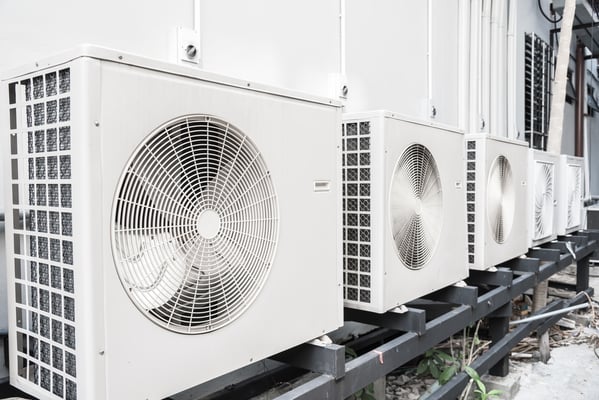Energy Efficiency Upgrades: Air Conditioning Systems

Air conditioning systems are normally the largest electrical loads in residential and commercial buildings. Many types of industrial machinery consume more energy than air conditioners in factory settings, but cooling systems still represent a significant load. In these cases, process cooling is a major expense that combines with air conditioning.
Power bills in buildings can be reduced significantly by upgrading air conditioning units and other cooling equipment. This is especially true in places with a warm climate or high electricity tariffs. However, an air conditioning upgrade requires careful analysis and planning to be effective.
Improve your building's air conditioning system and save on electricity bills.
Having equipment with a high nameplate efficiency is important, but the air conditioning system must also be specified according to the needs of the building. If the system configuration is not a good match for the building, even the most efficient equipment will suffer a performance loss.
Upgrading Air Conditioners According to Building Needs
Air conditioning systems have many different configurations, but they can generally be classified into two main types: unitary and central installations.
Unitary air conditioners are designed for specific areas, and they have a packaged design that includes all components necessary for operation. On the other hand, central air conditioning systems use a mechanical room for the main cooling equipment. The cooling effect is delivered with ducts and air handlers, and hydronic systems also use pumps and chilled water piping.
- Unitary air conditioners are recommended when building areas have very different operating schedules, since individual systems are independent from each other. A central air conditioning design is more cost-effective when building areas have similar cooling schedules.
- Central air conditioning systems with variable speed chillers can ramp down their capacity for part-load conditions. However, unitary systems offer the highest flexibility in applications where the cooling schedules don’t match.
There is equipment with an exceptional efficiency for both air conditioning configurations. In unitary installations, variable refrigerant flow (VRF) systems normally offer the highest efficiency. On the other hand, variable-speed water-cooled chillers tend to be the most efficient option for a central air conditioning system.
Importance of an Adequate Air Conditioning Capacity
When dealing with air conditioning design, more cooling capacity is not necessarily a good thing. Larger equipment is more expensive, and the cost of maintenance is also increased. Oversized air conditioners also tend to operate in short cycles, since they have so much spare capacity. This intermittent operation causes a faster mechanical wear.

Modern chillers and VRF units can ramp down their cooling output when their full capacity is not needed. This eliminates the issues of excessive energy consumption and mechanical wear, but the unused capacity still represents a wasted investment.
Energy consultants recommend a building envelope inspection before any HVAC upgrade. In particular you should check for insulation deficiencies and air leaks, which add to the cooling load. If these issues are fixed first, the workload on the air conditioning system is reduced. Therefore, the new units can be specified with a higher efficiency and a reduced nameplate capacity.
Concluding Remarks
Since air conditioning is the largest electrical load in most buildings, energy efficiency measures that target this system can achieve significant savings. The payback period is determined by many factors, including the local weather and electricity tariffs.
If you are considering an air conditioning upgrade, schedule it for a time of the year where disruption will be minimal. Summer is not a good time, since there is a high demand for installation and maintenance services. Once the cooling season has ended, there is time to improve cooling systems with minimal disruption. Upgrades are not recommended during summer, since the air conditioning system must stop operating, and the indoor temperature can become unbearable within hours.

Michael Tobias
Michael Tobias, the Founding Principal of NY Engineers, currently leads a team of 150+ MEP/FP engineers and has led over 4,000 projects in the US
Join 15,000+ Fellow Architects and Contractors
Get expert engineering tips straight to your inbox. Subscribe to the NY Engineers Blog below.

